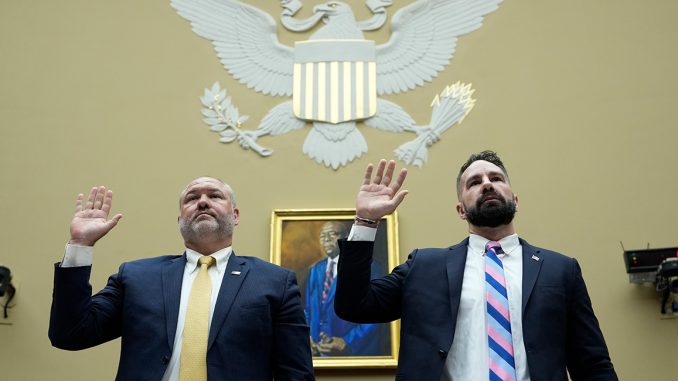
Last week, IRS Special Agent Gary Shapley and IRS criminal investigator Joseph Ziegler testified in detail about how Justice Department lawyers and FBI officials hindered their investigation of Hunter Biden‘s financial dealings. If their accusations are true, there is no longer any question that the FBI must be reformed from the ground up.
Both Shapley and Ziegler are decorated career civil servants. Ziegler noted that he is a gay Democrat who is risking his career, his reputation, and his casework.
These men have nothing to gain by coming forward. Yet what they saw as the lead investigators was so disturbing that they felt compelled to tell the truth.
Ziegler testified that Assistant U.S. Attorney Lesley Wolf and Justice Department attorney Mark Daly tipped off Biden‘s lawyers that the IRS investigators had discovered his storage unit, thereby making it possible to remove potentially incriminating evidence before a search could be executed.
The whistleblowers also recounted how Wolf refused to approve a search warrant for President Joe Biden‘s guest house where his son had been living, even though she acknowledged that they had probable cause. Her reason? Bad “optics” of executing a warrant at the president’s residence.
Shapley and Ziegler detailed many other irregularities by Justice Department lawyers and the FBI. This included not sharing evidence found on Hunter Biden‘s laptop or informing them of the bribery allegations made against the Bidens by a trusted confidential informant.
It’s hard to believe these actions arose from simple incompetence.
The whistleblowers also testified about the deliberate slow-walking of the tax fraud case against Hunter Biden, which let the statute of limitations run out on potential felony tax charges.
The IRS agents thought these were the clearest, most serious charges the first son faced.
Shapley said that last November, a tolling agreement that had extended the five-year statute of limitations was set to expire for Hunter Biden‘s evasion of taxes owed in 2014 and 2015.
A tolling agreement is often entered into between prosecutors and the target of an investigation in which the possible defendant agrees that the expiration of the statute of limitations will be waived through a certain date while the defendant and the prosecution continue to investigate, discuss, and potentially settle the case—such as with a plea agreement.
Hunter Biden‘s lawyers had agreed to such a tolling agreement, and Shapley says that the lawyers were willing to extend it past 2022. Yet according to Shapley, Delaware U.S. Attorney David Weiss let it expire. Why would any prosecutor do that?
And speaking of Weiss, Congress needs to hear more from him.
The whistleblowers testified that Weiss told them last Oct. 7 that he was “not the deciding official on whether charges are filed” against Hunter Biden and that the U.S. attorney for the District of Columbia “would not allow him to charge” the first son in Washington.
Shapley also testified that Weiss said that he had requested special-counsel status from the Justice Department but that his request was denied, a claim which Weiss is now seemingly denying.
After the whistleblowers came forward, Attorney General Merrick Garland testified before the Senate that “I have pledged not to interfere with that investigation, and I have carried through on my pledge.” Weiss, he said, “has the full authority to … bring cases in other jurisdictions if he feels that it’s necessary.”
This seems to contradict what Weiss told a room full of IRS agents, including the two whistleblowers.
So, who is telling the truth here?
One thing seems clear: Two dedicated career IRS agents—men with seemingly nothing to gain and everything to lose by coming forward—were prevented from following the evidence wherever it led as they investigated tax fraud and other potential crimes involving Hunter Biden and his associates.
To date, the Biden Justice Department hasn’t, and perhaps won’t, explain why.
Originally Published in The Washington Times.
Have an opinion about this article? To sound off, please email letters@DailySignal.com, and we’ll consider publishing your edited remarks in our regular “We Hear You” feature. Remember to include the URL or headline of the article plus your name and town and/or state.

